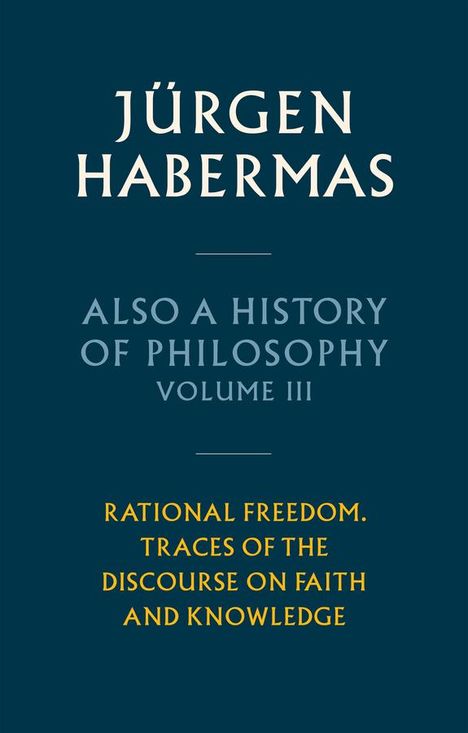Jürgen Habermas: Also a History of Philosophy, Volume 3, Gebunden
Also a History of Philosophy, Volume 3
- Rational Freedom. Traces of the Discourse on Faith and Knowledge
(soweit verfügbar beim Lieferanten)
- Übersetzung:
- Ciaran Cronin
- Verlag:
- Polity Press, 06/2025
- Einband:
- Gebunden
- Sprache:
- Englisch
- ISBN-13:
- 9781509558650
- Artikelnummer:
- 11969125
- Umfang:
- 560 Seiten
- Gewicht:
- 952 g
- Maße:
- 236 x 163 mm
- Stärke:
- 49 mm
- Erscheinungstermin:
- 4.6.2025
- Hinweis
-
Achtung: Artikel ist nicht in deutscher Sprache!
Klappentext
In the final volume of his history of philosophy, Jürgen Habermas offers a series of brilliant interpretations of the thinkers who set the agenda for contemporary philosophy. Beginning with masterful readings of Hume and Kant, he traces the genealogy of their postmetaphysical thinking through the main currents of historicism and German Idealism, and the multifarious reactions to Hegel's influential system, culminating in nuanced readings of Marx, Kierkegaard and Peirce. Through his analysis of their work, Habermas demonstrates the interpretive fecundity of the central themes of his philosophical enterprise - his pragmatist theory of meaning, his communicative theories of subjectivity and sociality, and his discursive theory of normativity in its moral, juridical and political manifestations.
In contrast to the bland compendia of thinkers and positions generally presented in surveys of the history of philosophy, Habermas's thematically focused interpretations are destined to provoke controversy and stimulate dialogue. With this work one of the indisputably great thinkers of our time presents a powerful vindication of his conception of philosophy as an inherently discursive - and not merely analytical or speculative - enterprise.
Biografie (Jürgen Habermas)
Der 1929 in Düsseldorf geborene deutsche Philosoph und Soziologe Jürgen Habermas studierte Philosophie, Geschichte und Psychologie in Göttingen, Zürich und Bonn, wo er 1954 promovierte. Von 1956 bis 1959 war er Assistent am Institut für Sozialforschung in Frankfurt am Main. und nahm dort wesentliche Impulse der Frankfurter Schule auf. Aus ihrer Tradition hat er die seine weiteren Arbeiten strukturierende Fragestellung entwickelt, wie eine kritische Theorie der Gesellschaft beschaffen zu sein habe, die eine dem erreichten Stand sozialwissenschaftlicher Erkenntnis wie historischer Erfahrung angemessene Theorie der Demokratie darstelle. 1961 habilitierte er in Marburg und wurde auf ein Extraordinariat für Sozialphilosophie nach Heidelberg berufen. 1964 erhielt er eine Professur für Philosophie und Soziologie in Frankfurt am Main. 1971 wurde er, gemeinsam mit Carl-Friedrich von Weizsäcker, Direktor des neu gegründeten "Max-Planck-Instituts zur Erforschung der Lebensbedingungen der wissenschaftlich-technischen Welt" in Starnberg. 1982 folgte Habermas dem Ruf nach Frankfurt am Main auf eine Professur für Soziologie und Philosophie. 2001 wurde er mit dem Friedenspreis des Deutschen Buchhandels ausgezeichnet.
